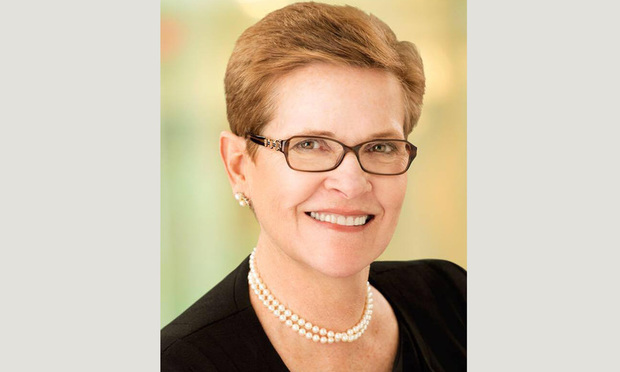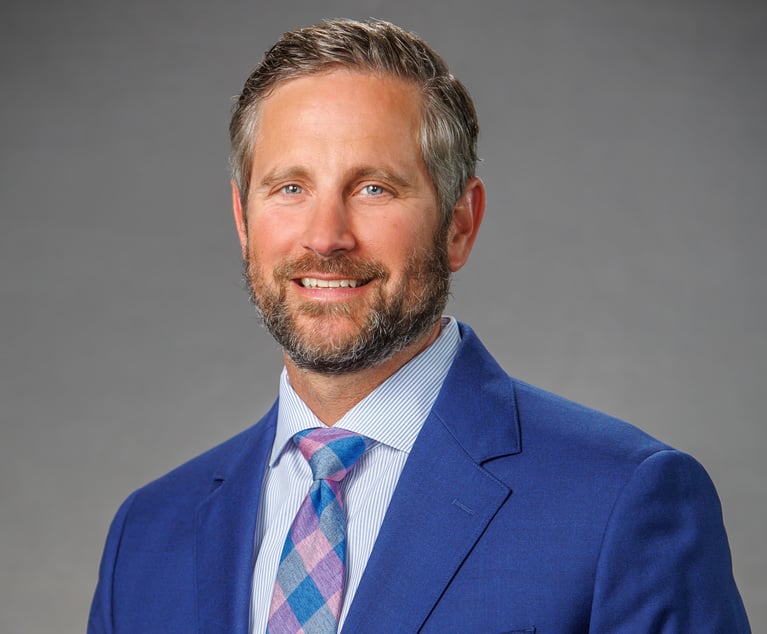Implicit Biases: You Don't Know What You Don't Know
To truly become diverse and embrace everyone equally, we must identify our biases and make a conscious effort to change our behavior.
October 17, 2019 at 01:54 PM
8 minute read
 Gail Ruopp, Law Firm Administrator with NJ Divorce Solutions Previte.
Gail Ruopp, Law Firm Administrator with NJ Divorce Solutions Previte.
Many professionals in the legal community believe that they are enlightened, and they actively support diversity and inclusion. Virtually, every law firm has a diversity and inclusion page on its website. But most of us are unaware of our biases. To truly become diverse and embrace everyone equally, we must identify our biases and make a conscious effort to change our behavior.
In 2012, I was introduced to an implicit bias survey designed by a group at Harvard to help people identify their unknown biases. The survey takes approximately 30 minutes of your undivided attention to effectively participate. The link to "Harvard Business Review Implicit Bias" survey is https://implicit.harvard.edu/implicit/. Before taking this survey, I was convinced I was unbiased, a person who treated all people equally. I was under the impression that I complied with equal opportunity laws, not only in hiring but in all my professional interactions. I believed that my personal interactions were unbiased as well. When I took the survey, I chose three categories: gender, race and age.
The results were beyond surprising to me. I was convinced that the test was faulty. My results indicated that I had significant biases against women, against younger people and toward men of color. After some soul searching, I realized that I was biased against women. When had a woman ever mentored me? When I was younger and I needed mentoring most, rarely were women in positions to mentor anyone. Only a few times was I mentored, and then, only by men. This year, on Women's Day, I attended a women's event where we discussed this subject at length. Apparently, many women are biased against women for this very reason.
I was significantly biased against younger people as well. I could not argue with that finding. It is common for each generation to think less highly of the generation that precedes them and follows them. There seems to be a natural generational bias against those younger or older.
I was also significantly biased toward men of color. I asked a colleague how that could be? She asked me, "If three people were applying for a job: a black man, you and a white man, who would probably get the job?" I immediately understood my bias—I could empathize with the professional struggles of the black man.
Because of the survey, I began to change my behavior. I caught myself taking care of the black man in a networking event and ignoring the opinions of younger people and women. To check my progress, I took the test four years later. Though my biases were still there, they were almost inconsequential—the results changed from significant to minimal!
You cannot fix what you do not know is broken. I strongly recommend that you participate in this survey or a similar one. Accept the results and continually monitor your actions.
After taking the survey, I convinced the partners at the firm where I worked to sponsor the Philadelphia Independence Business Alliance, which is the chamber of commerce for the LGBTQ community. I participated in their meetings and events, putting myself in an environment where I was the minority. Eventually, I was accepted—as was my firm. I have developed some long-standing professional and personal relationships with its members, and so have some of the firm's attorneys.
Verna Meyers is the author of a bestselling book titled: "What If I Say the Wrong Thing—25 Habits for Culturally Effective People." She is a woman of color, Harvard Law School educated, and speaks internationally about diversity and inclusion. She defines diversity as "being asked to the party," and inclusion as "being asked to dance." It may be possible to identify some of your implicit biases just by reading her book.
In her book, Meyers addresses people's names. I have been known to say, "Why can't everyone be named Mary or John so I can pronounce their names?" After reading her book, I now feel comfortable asking someone how to pronounce his name. I remember having to introduce a professional at an event a few years ago. I could easily pronounce her first name, but her last name was long with a lot of vowels and syllables. I asked her how to pronounce it, and she said, "Just introduce me by my first name." I respectfully refused. We practiced her last name a few times, and I properly introduced her. She was notably pleased. This interaction made a difference to her and hopefully to some people in the audience.
Meyers engages in a lot of air travel. In her book, she discusses an instance when she was boarding a plane and noticed that the pilot was a young woman of color. She didn't think anything about it. During the flight there was turbulence. She thought to herself, "I hope she knows what she is doing." Meyers boarded a plane a few months later. A white man about 40 years old was the pilot. Again, there was turbulence. She did not think, "I hope he knows what he is doing." This disparity caused by her implicit bias did not occur to her until after that second flight. Her story demonstrates that no matter how enlightened and forward thinking we think we are, our view of ourselves demands constant monitoring of our thoughts and behaviors.
Earlier this year, I attended a diversity seminar in New York City. The speaker asked us to provide examples of when we had been treated differently. Many people shared their experiences. Then he asked us who had discriminated against someone else. Not so many people shared these experiences. The people who did share their experiences were working predominantly in human resources and were regularly reviewing resumes and biographies.
For this reason, I advise people not to include their addresses on their resumes—no one needs to know where you live. Do not include your year of graduation from college—anyone can subtract 20 and get close to the year you were born. Early in my career, I used only my initials and not my first name to avoid sexual discrimination, and I made sure my resume did not include any female predominant positions such as "assistant." I just wanted to get to the interview. Of course, my gender and approximate age would be evident at the first encounter, but at least I would not be dismissed based on my resume. As you may have realized from my resume tips, it is also important to understand that people may have an unknown bias against you.
I recently read "Emotional Intelligence," written by Daniel Goleman. He defines emotional intelligence as "the ability to identify, assess, and control one's own emotions, the emotions of others, and that of groups." While reading the book, I was confronted with a potentially toxic situation in work and was able to defuse the situation because of what I had recently read. There are several books published about this topic. A person's emotional intelligence is just as important as a person's IQ. All leaders in law firms should at least understand emotional intelligence.
An organization can sponsor some basic initiatives.
- Choose a day for a firm lunch to which people bring a cultural dish, and then encourage them to discuss what they brought.
- At the next partner meeting, share a book on diversity, inclusion or emotional intelligence. Purchase a book for each partner—it is a small investment with a potentially large return.
- At a retreat, create a trivia game in which everyone participates. The trivia can span cultures, generations, races and gender.
We can all become more self-aware and proactively adjust our behaviors. But, we cannot fix those things that we do not see as broken. When we are dealing with things implicit, like our biases, we need ways to see them. Again, you don't know what you don't know.
Gail Ruopp has over 25 years' experience in the management and direction of privately held professional entities that includes finance, accounting, personnel, operations, systems, real estate negotiations and various levels of marketing. Most recently, she served as the executive director for an intellectual property firm in Philadelphia. She is currently serving as firm administrator at NJ Divorce Solutions in Edison, New Jersey. Contact her at [email protected].
This content has been archived. It is available through our partners, LexisNexis® and Bloomberg Law.
To view this content, please continue to their sites.
Not a Lexis Subscriber?
Subscribe Now
Not a Bloomberg Law Subscriber?
Subscribe Now
NOT FOR REPRINT
© 2025 ALM Global, LLC, All Rights Reserved. Request academic re-use from www.copyright.com. All other uses, submit a request to [email protected]. For more information visit Asset & Logo Licensing.
You Might Like
View All

Products Liability: The Absence of Other Similar Claims—a Defense or a Misleading Effort to Sway a Jury?


K&L Gates Sheds Space, but Will Stay in Flagship Pittsburgh Office After Lease Renewal
Trending Stories
- 1'It's Not Going to Be Pretty': PayPal, Capital One Face Novel Class Actions Over 'Poaching' Commissions Owed Influencers
- 211th Circuit Rejects Trump's Emergency Request as DOJ Prepares to Release Special Counsel's Final Report
- 3Supreme Court Takes Up Challenge to ACA Task Force
- 4'Tragedy of Unspeakable Proportions:' Could Edison, DWP, Face Lawsuits Over LA Wildfires?
- 5Meta Pulls Plug on DEI Programs
Who Got The Work
Michael G. Bongiorno, Andrew Scott Dulberg and Elizabeth E. Driscoll from Wilmer Cutler Pickering Hale and Dorr have stepped in to represent Symbotic Inc., an A.I.-enabled technology platform that focuses on increasing supply chain efficiency, and other defendants in a pending shareholder derivative lawsuit. The case, filed Oct. 2 in Massachusetts District Court by the Brown Law Firm on behalf of Stephen Austen, accuses certain officers and directors of misleading investors in regard to Symbotic's potential for margin growth by failing to disclose that the company was not equipped to timely deploy its systems or manage expenses through project delays. The case, assigned to U.S. District Judge Nathaniel M. Gorton, is 1:24-cv-12522, Austen v. Cohen et al.
Who Got The Work
Edmund Polubinski and Marie Killmond of Davis Polk & Wardwell have entered appearances for data platform software development company MongoDB and other defendants in a pending shareholder derivative lawsuit. The action, filed Oct. 7 in New York Southern District Court by the Brown Law Firm, accuses the company's directors and/or officers of falsely expressing confidence in the company’s restructuring of its sales incentive plan and downplaying the severity of decreases in its upfront commitments. The case is 1:24-cv-07594, Roy v. Ittycheria et al.
Who Got The Work
Amy O. Bruchs and Kurt F. Ellison of Michael Best & Friedrich have entered appearances for Epic Systems Corp. in a pending employment discrimination lawsuit. The suit was filed Sept. 7 in Wisconsin Western District Court by Levine Eisberner LLC and Siri & Glimstad on behalf of a project manager who claims that he was wrongfully terminated after applying for a religious exemption to the defendant's COVID-19 vaccine mandate. The case, assigned to U.S. Magistrate Judge Anita Marie Boor, is 3:24-cv-00630, Secker, Nathan v. Epic Systems Corporation.
Who Got The Work
David X. Sullivan, Thomas J. Finn and Gregory A. Hall from McCarter & English have entered appearances for Sunrun Installation Services in a pending civil rights lawsuit. The complaint was filed Sept. 4 in Connecticut District Court by attorney Robert M. Berke on behalf of former employee George Edward Steins, who was arrested and charged with employing an unregistered home improvement salesperson. The complaint alleges that had Sunrun informed the Connecticut Department of Consumer Protection that the plaintiff's employment had ended in 2017 and that he no longer held Sunrun's home improvement contractor license, he would not have been hit with charges, which were dismissed in May 2024. The case, assigned to U.S. District Judge Jeffrey A. Meyer, is 3:24-cv-01423, Steins v. Sunrun, Inc. et al.
Who Got The Work
Greenberg Traurig shareholder Joshua L. Raskin has entered an appearance for boohoo.com UK Ltd. in a pending patent infringement lawsuit. The suit, filed Sept. 3 in Texas Eastern District Court by Rozier Hardt McDonough on behalf of Alto Dynamics, asserts five patents related to an online shopping platform. The case, assigned to U.S. District Judge Rodney Gilstrap, is 2:24-cv-00719, Alto Dynamics, LLC v. boohoo.com UK Limited.
Featured Firms
Law Offices of Gary Martin Hays & Associates, P.C.
(470) 294-1674
Law Offices of Mark E. Salomone
(857) 444-6468
Smith & Hassler
(713) 739-1250





